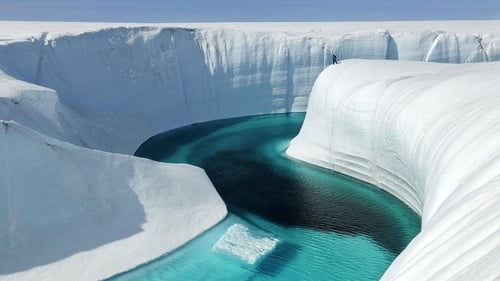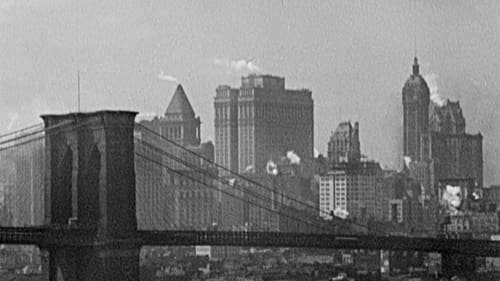The Sign of Doom (2022)
Genre : Documentary
Runtime : 18M
Director : Enggar Asfinsani
Synopsis
The pandemic has changed many things. Including Alfia, she is a teacher who has learned a lot from the phenomenon she saw. For Alfia, trash is no longer appropriate to be disposed of in its place.

A train speeds through the country on its way to Berlin, then gradually slows down as it pulls into the station. It is very early in the morning, about 5:00 AM, and the great city is mostly quiet. But before long there are some signs of activity, and a few early risers are to be seen on the streets. Soon the new day is well underway. It's just a typical day in Berlin, but a day full of life and energy.

Darman, his daughter Ida, and Slamet the servant, go into the woods to hunt. Ida was lost when Darman and Slamet are chasing a tiger. Ida ends up in Tarsan's hut. They become close though at first, Tarsan has problems speaking the Indonesian language. Then he agrees to go to the city and learn how to be an urbanite. It is not easy as he is even harassed by Ida’s friends who do not like him.

Humanity’s ascent is often measured by the speed of progress. But what if progress is actually spiraling us downwards, towards collapse? Ronald Wright, whose best-seller, “A Short History Of Progress” inspired “Surviving Progress”, shows how past civilizations were destroyed by “progress traps”—alluring technologies and belief systems that serve immediate needs, but ransom the future. As pressure on the world’s resources accelerates and financial elites bankrupt nations, can our globally-entwined civilization escape a final, catastrophic progress trap? With potent images and illuminating insights from thinkers who have probed our genes, our brains, and our social behaviour, this requiem to progress-as-usual also poses a challenge: to prove that making apes smarter isn’t an evolutionary dead-end.

The faces of a 5:00 PM crowd descending via the Pan Am building escalators in one continuous shot. In old-fashioned black and white, these faces stare into the empty space, in the 5:00 PM tiredness and mechanical impersonality, like faces from the grave.

When National Geographic photographer James Balog asked, “How can one take a picture of climate change?” his attention was immediately drawn to ice. Soon he was asked to do a cover story on glaciers that became the most popular and well-read piece in the magazine during the last five years. But for Balog, that story marked the beginning of a much larger and longer-term project that would reach epic proportions.

It is the largest movement the world has ever seen, it may also be the most important - in terms of what's at stake. Yet it's not east being green. Environmentalists have been reviled as much as revered, for being killjoys and Cassandras. Every battle begins as a lost cause and even the victories have to be fought for again and again. Still, environmentalism is one of the great social innovations of the twentieth century, and one of the keys to the twenty-first. It has arisen at a key juncture in history, when humans have come to rival nature as a power determining the fate of the earth.

Filmed over nearly five years in twenty-five countries on five continents, and shot on seventy-millimetre film, Samsara transports us to the varied worlds of sacred grounds, disaster zones, industrial complexes, and natural wonders.

Morning reveals New York harbor, the wharves, the Brooklyn Bridge. A ferry boat docks, disgorging its huddled mass. People move briskly along Wall St. or stroll more languorously through a cemetery. Ranks of skyscrapers extrude columns of smoke and steam. In plain view. Or framed, as through a balustrade. A crane promotes the city's upward progress, as an ironworker balances on a high beam. A locomotive in a railway yard prepares to depart, while an arriving ocean liner jostles with attentive tugboats. Fading sunlight is reflected in the waters of the harbor. The imagery is interspersed with quotations from Walt Whitman, who is left unnamed.

This short experimental film tells the story of a man who comes to Hollywood to become a star, only to fail and be dehumanized. He is identified by the number 9413 written on his forehead.

A group of surfers arrives in a remote spot off the Australian coast, and the isolation and pressure push one person over the edge, leading to a violent outburst and a fight for survival.

Set in 1896, "Tjoet Nja' Dhien" celebrates one of Indonesia's great heroes who fought for independence from the Dutch. The pious Muslim people of Aceh, a city that had flourished since ancient times as a trade port, enter into a fierce war with the Dutch. Tjoet Nja' Dhien, the widow of a rebel leader operating in Aceh in Sumatra, assumes the leadership when her husband Teuku Uma is killed in an ambush. Dhien's charismatic presence and power of survival motivate the locals to join and later continue their opposition to the Dutch. Despite personal obstacles, she remained in the thick of the struggle for ten years.

The Dutch East Indies, at the end of the nineteenth century. An adventurous captain of an American merchant vessel is looking for a sunken Dutch vessel containing 10,000 precious diamonds. Unfortunately, he's not the only one and then there's also that volcano on the nearby island of Krakatau, waiting to explode in its historical, disastrous eruption...

In the same vein as Meri's other documentations, this one takes advantage of the glasnost policy to discuss the social and ecologic impact of the Russian oil industry on the natives and the lands they inhabit.

Tar Creek is an environmentally devastated area in northeastern Oklahoma with acidic creeks, stratospheric lead poisoning and enormous sinkholes. Nearly 30 years after being designated as a Superfund cleanup program, residents are still struggling.

A winter portrait of North Dakota's oil boom as seen through unexpected eyes.

Most people were first exposed to Michael C. Ruppert through the 2009 documentary, Collapse, directed by Chris Smith. Apocalypse, Man is an intimate portrait of a man convinced of the imminent collapse of the world, but with answers to how the human spirit can survive the impending apocalypse.

The environmental measures taken by the oil industry at the Sullom Voe terminal in the Shetlands.
















